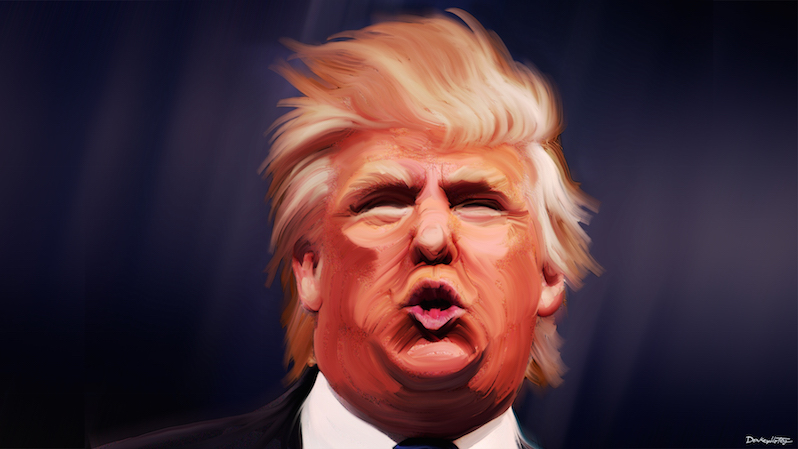Donald Trump’s ‘To Be Determined’ Approach Threatens Democracy’s Ideal
Have a candidate’s political strategists ever before treated their candidate like a rambunctious child and spoken of their pride that they finally coaxed him to “stay on message”? Donald Trump: His detractors see an indifference to truth and consistency. (DonkeyHotey / Wikimedia)
Donald Trump: His detractors see an indifference to truth and consistency. (DonkeyHotey / Wikimedia)
Donald Trump: His detractors see an indifference to truth and consistency. (DonkeyHotey / Wikimedia)
Only the naive have ever believed that democracy is solely a noble contest over competing ideas, proposals and solutions. Emotion looms large in every human decision, including how we cast our ballots, and smart politicians have always blended appeals to the heart and the gut with their entreaties to reason.
We cherish what might be called the Lincoln-Douglas approach to politics, inspired by the 1858 debates between Honest Abe and “The Little Giant,” Stephen Douglas, when the two candidates went from place to place in Illinois arguing with great eloquence about the future of slavery. But we forget that even in those debates, emotion was often in the saddle. Racism was at work, and so was a passionate anger at “the Slave Power,” the popular term in the North for the domination of the federal government by southern planters.
For decades, political scientists have blasted away at electoral models based primarily on the idea of rational choice. In the most recent and sophisticated entry in the field, “Democracy for Realists,” Christopher Achen and Larry Bartels argue that even well-informed and politically engaged voters mostly choose candidates based on their social identities and partisan loyalties. Judging from the 2016 polls, that theory looks pretty good.
And in a brilliant article for Vox, Lee Drutman of the New America Foundation shows how Donald Trump, far from being an aberration from the trajectory of Republican politics, is instead “a historical culmination” of a strategy rooted in racial feeling. The irony for Republicans, he notes, is that “this strategy reached its full completion at precisely the moment when it was no longer a winning national strategy.”
In an increasingly non-white country in which the younger and better educated are relatively liberal on matters of diversity, Trump has divided voters on race and immigration in a way that worked in the Republican primaries but is failing him with the broader electorate.
Drutman’s insight explains Trump’s whirls and twirls over his approach to immigration, as well as his sudden visit to Mexican President Enrique Pena Nieto and his evasively anodyne statement afterward. Trump is asking some to believe that he is an authentic nativist and racist who really thinks Mexican immigrants are “rapists,” and more middle-of-the-road voters to see him as a fake nativist and racist willing to adjust to whatever position will make them breathe easier.
One way or the other, how can anyone with strong commitments on any issue now support Trump? Rarely has a candidate embarked upon such an extended public negotiation with himself over the core promise of his campaign — and Trumpism has been about immigration if it has been about anything. Imagine the campaign manager for any other candidate saying what Kellyanne Conway said earlier this month about Trump’s position on his signature issue. It was, she said, “to be determined.”
What would have happened to Ronald Reagan’s campaign manager if, at this point in the 1980 campaign, he had said that The Gipper’s views on Communism or taxes were “to be determined”? Or if a top Barack Obama aide had said the same in 2008 about his view of the Iraq War?
Have a candidate’s political strategists ever before treated their candidate like a rambunctious child and spoken of their pride that they finally coaxed him to “stay on message”? The high-spirited boy may send out the offensive tweet now and again, but look how much better he’s being! And don’t you have to admire his gift for large gestures, like suddenly throwing a trip to Mexico on his schedule?
Trump’s indifference to truth and consistency is what happens when the honest efforts of political scientists to grapple with the balance between the rational and irrational in politics become an excuse for absolute cynicism — about voters, their attention spans, and democracy itself. Return to Lincoln and Douglas: Yes, they used emotion, but each also had carefully considered, strongly held views about slavery and the Union. The politicians we most respect try to persuade their fellow citizens not simply to vote for them but also to share at least some of their view of the world.
Political realists are right to challenge purely idealistic views of politics that mislead us into ignoring the role of power, group interest and the imperfections of all of us who vote. But the democratic idea is in grave jeopardy when citizens simply shrug over being manipulated and don’t expect more from their political leaders than posturing, positioning, and captivating media circuses.
Your support matters…Independent journalism is under threat and overshadowed by heavily funded mainstream media.
You can help level the playing field. Become a member.
Your tax-deductible contribution keeps us digging beneath the headlines to give you thought-provoking, investigative reporting and analysis that unearths what's really happening- without compromise.
Give today to support our courageous, independent journalists.









You need to be a supporter to comment.
There are currently no responses to this article.
Be the first to respond.